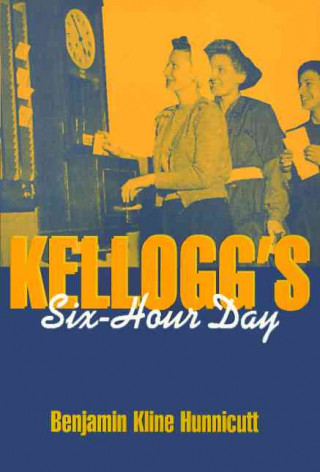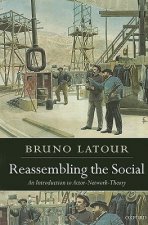
Kód: 05082130
Kellogg's Six-Hour Day
Autor Benjamin Kline Hunnicutt
On December 1, 1930, at the start of the Great Depression, W.K. Kellogg replaced the traditional three daily eight-hour shifts in his cereal plant with four six-hour shifts. By adding on a new shift he and his managers created job ... celý popis
- Jazyk:
 Angličtina
Angličtina - Vazba: Brožovaná
- Počet stran: 261
Nakladatelství: Temple University Press,U.S., 1996
- Více informací o knize

Mohlo by se vám také líbit
-

American Historical Romance
1712 Kč -

The Big Bang and Georges Lemaître
6578 Kč -

PCR Strategies
4704 Kč -

Languages and Compilers for Parallel Computing
1681 Kč -

Mars, A Cosmic Stepping Stone
705 Kč -

Diadochenfrieden von 311 v. Chr. Vorgeschichte, Inhalte und Folgen
1271 Kč -

Okkultismus
236 Kč
Dárkový poukaz: Radost zaručena
- Darujte poukaz v libovolné hodnotě a my se postaráme o zbytek.
- Poukaz se vztahuje na celou naši nabídku.
- Elektronický poukaz vytisknete z e-mailu a můžete ihned darovat.
- Platnost poukazu je 12 měsíců od data vystavení.
Informovat o naskladnění knihy
Zadejte do formuláře e-mailovou adresu a jakmile knihu naskladníme, zašleme vám o tom zprávu. Pohlídáme vše za vás.
Více informací o knize Kellogg's Six-Hour Day
Nákupem získáte 111 bodů
 Anotace knihy
Anotace knihy
On December 1, 1930, at the start of the Great Depression, W.K. Kellogg replaced the traditional three daily eight-hour shifts in his cereal plant with four six-hour shifts. By adding on a new shift he and his managers created jobs for employees that the company had laid off and for other unemployed persons in Battle Creek, Michigan. Kellogg's six-hour day was the pinnacle of a hundred-year process that cut working time virtually in half. Kellogg Management, propelled by a vision of Liberation Capitalism, insisted that six hours would revolutionize society by shifting the balance of time from work to leisure - from economic concerns to the challenge of freedom. Kellogg's employees, like centuries of workers, believed that work was a means to an end. An overwhelming number of employees were willing to "share their work" and found the extra time an opportunity to invest in the family, community, church, and individual freedom.When World War II ended, Kellogg's managers abandoned the six-hour shift and began with the rest of the nation to define progress as more work for more people. Losing sight of the original dream of more time to live outside necessity, management argued that work should remain the center of life, providing identity, meaning, and purpose to an otherwise meaningless existence. Hunnicutt documents the struggle of those workers, mostly women, who resisted management and the new beliefs about work's centrality. They fought to keep their six-hour shifts until 1985, and in the process preserved the century-old vision of "progressive shortening of the hours of labor."Their story is a monument to workers' struggle for control over their lives and for substantial freedom beyond necessity. It serves as a reminder of a remarkable vision of progress, offering hope and guidance to the last decade of this century when layoffs, downsizing, mandatory overtime, and a "jobless future" plague the nation. Benjamin Kline Hunnicutt is Professor of Leisure Studies at the University of Iowa. He is also the author of "Work Without End: Abandoning Shorter Hours for the Right to Work" (Temple).
 Parametry knihy
Parametry knihy
Zařazení knihy Knihy v angličtině Society & social sciences Sociology & anthropology Sociology
1112 Kč
- Plný název: Kellogg's Six-Hour Day
- Autor: Benjamin Kline Hunnicutt
- Jazyk:
 Angličtina
Angličtina - Vazba: Brožovaná
- Počet stran: 261
- EAN: 9781566394482
- ID: 05082130
- Nakladatelství: Temple University Press,U.S.
- Hmotnost: 378 g
- Rozměry: 152 × 225 × 15 mm
- Datum vydání: 29. October 1996
Oblíbené z jiného soudku
-

Sex at Dawn
330 Kč -

Death and the Afterlife
490 Kč -

Cartoon Guide to Statistics
463 Kč -

Why Love Hurts - A Sociological Explanation
451 Kč -

Past Mortems
249 Kč -

Basic and Advanced Focus Groups
1076 Kč -

Fair Play Deck
515 Kč -

Intimate Communion
341 Kč -

Tragedy and Hope
1124 Kč -

Small Is Beautiful
276 Kč -

More Than Two
616 Kč -

Regretting Motherhood
350 Kč -

Social Intelligence
378 Kč -

True Believer
362 Kč -

Art of Community: Seven Principles for Belonging
485 Kč -

NINETY PERCENT OF EVERYTHING
400 Kč -

Reassembling the Social
1056 Kč -

Family and Civilization
538 Kč -

Book of Tea
250 Kč -

Building and Dwelling
433 Kč -

Constructing Grounded Theory
1305 Kč -

Surrendered Wife
276 Kč -

Of Woman Born
373 Kč -

Cruel Optimism
782 Kč -

Death and the Afterlife
914 Kč -

What Kinship Is-And Is Not
510 Kč -

Social History of Sexual Relations in Iran
1396 Kč -

Post-Adoption Blues
446 Kč -

Dissecting the Danchi
3723 Kč -

Birth Of A Mother
556 Kč -

New Old Fashioned Ways
470 Kč -

Secret Meaning of Money - How to Prevent Financial Problems from Destroying Our Most Intimate Relationships
963 Kč -

Platform Society
1003 Kč -

Death Tourism
1006 Kč -

Braving the Wilderness
247 Kč -

Eroticism
303 Kč -

Marriage, a History
465 Kč -

Bushido the Soul of Japan
289 Kč -

Intercourse
384 Kč -

Ideology and Utopia
462 Kč -

Population Control
357 Kč -

Class Ceiling
324 Kč -

Chrysanthemum and the Sword
435 Kč -

Smoke Gets in Your Eyes
302 Kč -

Sociology: A Very Short Introduction
249 Kč -

Being Mortal
323 Kč -

Theory of the Leisure Class
303 Kč -

Social Construction of Reality
302 Kč -

Bushido: The Soul Of Japan
517 Kč
Osobní odběr Praha, Brno a 12903 dalších
Copyright ©2008-24 nejlevnejsi-knihy.cz Všechna práva vyhrazenaSoukromíCookies



 Vrácení do měsíce
Vrácení do měsíce 571 999 099 (8-15.30h)
571 999 099 (8-15.30h)